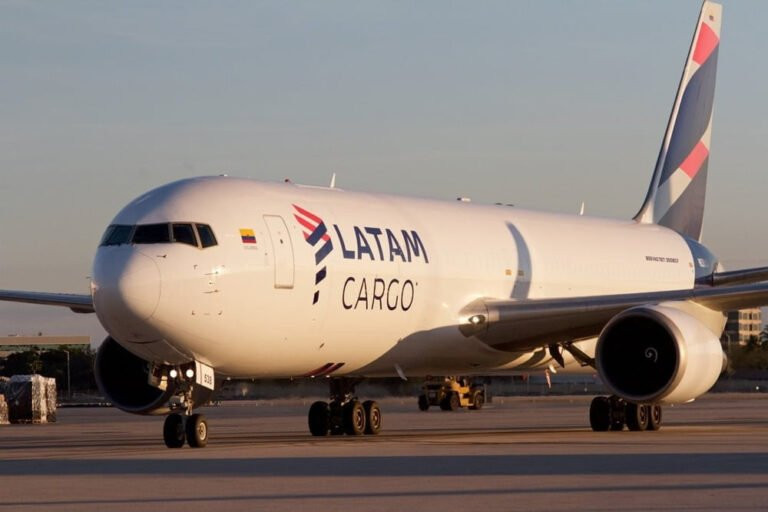As the effects of climate change become more pronounced and societal awareness increases, the pressure on the logistics industry and airlines will only grow. Therefore, the ability of stakeholders to contribute to tackling climate is fundamental if they want customers to continue choosing their services.
While the industry recognises the imperative to balance the demand for air cargo services with escalating environmental concerns, the approach involves a multifaceted strategy, including optimising flight routes to minimise fuel consumption and emissions, implementing load factor optimisation techniques to maximise cargo capacity per flight, and collaborating with industry partners to explore sustainable aviation fuel alternatives.
“Delivering on the industry´s goal of being net-zero by 2050 is a must. As currently structured, we are a carbon-intensive industry that has no commercially viable alternatives to address this challenge,” Claudio Torres, Commercial SVP in South America at LATAM Cargo, said.
“This means we have 30 years to find effective ways to reduce CO2, make them economically viable and make them available all over the world. It is safe to say that this is the most ambitious project the industry has embarked on.
“We are already seeing mounting social pressure for the industry to take action as well as greater demands from select passengers and corporate customers in particular, as businesses look to tackle their Scope 3 emissions.
“In fact, this presents an enormous opportunity for the industry to help share the cost burden of the transition. Through a robust compendium of initiatives, we aim to drive sustainable development in South America.”
Strategic pillars
In May 2021, LATAM Group launched its sustainability strategy aiming to become an asset in the countries where it operates by generating economic, social, and environmental value in each of them and, thus, contributing to the protection of South America’s ecosystems for the next 30 years.
The airline set challenging and measurable goals across three pillars: Climate Change, Shared Value and Circular Economy, which were designed in collaboration with experts and environmental organisations from across the region.
In the Climate Change pillar, LATAM Group is committed to achieving carbon neutrality. In the case of the Shared Value pillar, the airline seeks to expand and strengthen its network of partnerships as part of its Solidarity Plane programme, making cargo and passenger capacity available to contribute to causes related to health, the environment, and natural disasters within the region. Finally, under the Circular Economy pillar, LATAM Group has pledged to eliminate 100 percent of its single-use plastics and become a group with zero waste to landfills by 2027.
Sustainable fuel and offsetting emissions
At LATAM, the carrier has made sustainability a priority, with CO2 reduction a key part of its plan based on fuel efficiency, operational and new technology initiatives, the use of sustainable aviation fuel (SAF) and as a complementary measure: CO2 offsetting.
“The industry is working hard trying to find ways to solve the problem. Most stakeholders, from aircraft manufacturers to airports, to airlines, to customers, to industry bodies like IATA, are pushing towards emission reductions. But there is lots to be done,” Torres admitted.
“On one hand, an improved regulatory framework that creates the right incentives while preserving a fair operating environment. On the other hand, governments need to address issues like antiquated air traffic control systems that create major inefficiencies. Third, we need to educate all stakeholders better about the real impact of mechanisms like SAF and offsets to ensure a resource allocation that leads to truly relevant solutions. Fourth, we need a strong pipeline of technological initiatives -from better engines to new fuels to carbon capture plants- that help reduce the issue at its core.”
SAF availability is limited worldwide; right now, production is concentrated in Europe and the United States, hence, it needs to be transported to other regions lacking supply; this translates into additional costs and CO2 emissions.
For airlines not located in the production areas, an immediate solution is to adopt the book and claim methodology, but in the short-medium term there will be an increasing requirement for SAF produced locally to ensure production and feedstock quality and traceability.
Project costs for SAF production remain high with feedstocks like cooking oil being tight. A challenge facing the sector is, therefore, sourcing enough raw materials to guarantee availability of a variety of high quality feedstocks and prioritise investment to scale up production in order to offer competitive prices.
“We have an offsetting programme: “1+1 Offset to Conserve,” where customers have the possibility to offset their cargo shipments CO2 footprint supporting conservation projects in the region, where we commit to cover 50 percent of the compensation cost, thus offsetting 100 percent of their total emissions together,” Torres explained.
“With this initiative, we look to preserve some of the most important ecosystems in the world, located in South America. As such, we have a long-term partnership with the project CO2Bio, located in the Flooded Savannas of the Orinoquia Region in Colombia, which aims, by 2030, to protect 575,000 hectares of land, over 2,000 species and benefit over 700 families.
“At COP28, LATAM and Future Carbon announced a letter of intent to help preserve over 22.000 hectares of the Amazon Rainforest and Cerrado ecosystems, located in Mato Grosso near the deforestation arch of the Amazon.”





